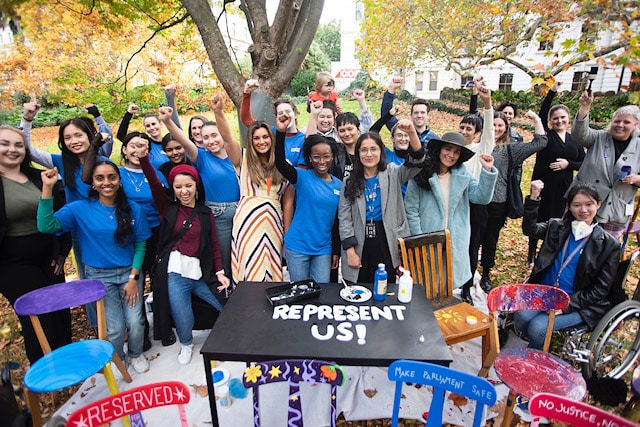Queer kids like me can’t wait for decades more of slow change, especially when we are so firmly kept out of positions where power and influence could transform our lives, writes Janice Sam.
Wear It Purple Day is a grass-roots initiative from young LGBTQI+ activists that aims to celebrate diversity, to commemorate the years of queer rights activism as well as raise awareness of the struggles queer folks have had to face here in Australia. Over the years it has shifted from negative mental health impacts and self-harm prevention to also celebrate rainbow young people and pride.
Wear It Purple Day is now a day celebrated outside of (more progressive) education settings; it’s something you are more likely to come across in a corporate office – those once 14-year-old queer activists standing up for losing their friends are well and truly in the workplace and wanting a safer and more inclusive job. You might even see purple cupcakes more commonplace at a local bakery, or see a local landmark lit up with purple lights.
While LGBTIQA+ campaigns and public support is seemingly mainstreaming in its celebration of inclusion, it can for some of us still feel like we missed the memo on queer being cool and profitable – particularly when so many live in fear and are fundamentally unsafe in our lives.
While we have celebrated the day since 2010 – and since welcomed marriage equality – Australia continues to have a problematic relationship with the LGBTQI+ community, often offering an olive branch with one hand and a discriminatory and harmful law with the other.
Politics is an excellent example. In February politicians were lining up to march with the queer community at the Midsumma Pride March while at the same time, the Religion Discrimination Bill was passing through the Lower House of Federal Parliament.
Yes, the bill stalled, but not before tens of thousands of protesters gathered across the nation to protest against the passing of a bill that would’ve had severe negative impacts on the queer community.
If the Religion Discrimination Bill was passed, religious schools would have had more legal grounds to discriminate against queer students, parents and staff. We would have unwound any progress we have made on conversion therapy, a cruel practice that still hasn’t been banned in all states.
It is not enough to protest or wear purple. Although we encourage all forms of colourful civic action, you have to support systemic change that gives agency, rights and support to the queer community.
I can’t help thinking if the LGBTIQA+ community had more representation in politics, we might be looking at a very different type of bold 2022 leadership.
As a starting point, conversion therapy should be banned at a federal level, not left up to the states. Gender affirmation therapy, as well as gender-informed, trauma-informed and culturally informed healthcare should not only be allowed but be affordable and accessible to provide better care for the queer community.
Colonisation, British law adherence and erasure of sister girls, brother boys and gender diverse First Nations people are part of a shameful Australian LGBTIQA+ history. Back in my home country of Brunei, anyone who publicly comes out as queer in 2022 faces capital punishment and can be stoned to death. The government justifies their cruel practice, stating that “you can still be a ‘gay person’; you’re just not allowed to act ‘gay’”. The justification is made on the assumption that we can just separate a crucial aspect of our identity from our individual selves. Hence, we are forced to remain in the closet where we’re unseen, unheard and unaccepted.
There are more than 70 countries that continue to criminalise LGBTIQA+ people and their justification is made on the basis of ‘morality’ and ‘religion’.
Queer folks have the rights to live without fearing for our lives and being mistreated in society. We don’t want Wear It Purple Day to exist in a vacuum, we need concrete actions to create structural and systemic in the form of legislative, policy and leadership changes that address equity across society.
I don’t want young queer people to continue to be overrepresented in dire stats, or doxed online in viscous bullying for who they are. But I do want to see them get the support and affirming healthcare they need, the right to education they deserve and pathways to leadership they excel in.
We will continue to show up, share our stories, forge new paths of leadership, eat the purple cupcakes and pull out our rainbow socks for the occasion but know that we need so much more from allies. Our voices matter, we deserve to be heard. We deserve to be accepted and treated as equals and to lead a new wave of change.
What can you do?

